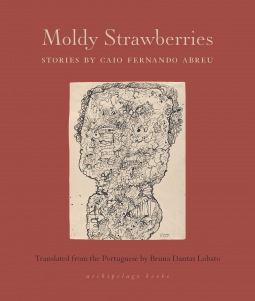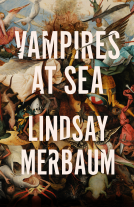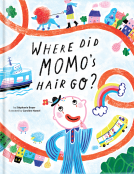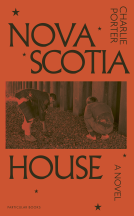
Moldy Strawberries
Stories
by Caio Fernando Abreu
This title was previously available on NetGalley and is now archived.
Send NetGalley books directly to your Kindle or Kindle app
1
To read on a Kindle or Kindle app, please add kindle@netgalley.com as an approved email address to receive files in your Amazon account. Click here for step-by-step instructions.
2
Also find your Kindle email address within your Amazon account, and enter it here.
Pub Date 14 Jun 2022 | Archive Date 7 Apr 2022
Talking about this book? Use #MoldyStrawberries #NetGalley. More hashtag tips!
Description
In these surreal and gripping stories about desire, tyranny, fear, and love, one of Brazil’s greatest queer writers appears in English for the first time
In 18 daring, scheming stories filled with tension and intimacy, Caio Fernando Abreu navigates a Brazil transformed by the AIDS epidemic and stifling military dictatorship of the 80s.
Tenderly suspended between fear and longing, Abreu’s characters grasp for connection:
- A man speckled with Carnival glitter crosses a crowded dance floor and seeks the warmth and beauty of another body.
- A budding office friendship between two young men turns into a surprising love, “a strange and secret harmony." One man desires another but fears a clumsy word or gesture might tear their plot to pieces.
Abreu writes the stories of people whose intimate lives are on the verge of imploding at all times. Even simple gestures—a salvaged cigarette, a knock on the door from the hazy downpour of a dream, a tight-lipped smile—are precarious offerings. Junkies, failed revolutionaries, poets, and conflicted artists face threats at every turn. But, inwardly ferocious and secretly resilient, they heal.
In these stories there is luminous memory and decay, and beauty on the horizon.
Translated by Bruna Dantas Lobato, currently an Iowa Arts Fellow and MFA candidate in Literary Translation at the University of Iowa.
Advance Praise
"Abreu’s prose shimmers and always surprises—each story is a small, bright gem. The fearless writing in this beautiful collection deserves a vast English-language readership."
– Publishers Weekly, starred review
"Caio Fernando Abreu’s Moldy Strawberries introduces one of Brazil’s most important and original prose writers to English language readers. Translated with expert nuance and brio by Bruna Dantas Lobato, Abreu’s collection depicts the almost forgotten world of 1980s Brazil, a world shaped by military dictatorship, AIDS, and economic crisis, filtered through a rich and multilayered queer sensibility. You will want to add this startling collection to your bookshelf."
– John Keene, author of Counternarratives and Annotations
"Abreu's writing teems with the desperate and dispirited, beatific loners who are propelled by a gravitational hunger for some shred of authenticity or understanding, for intimate correspondence with another. There are monumental truths to be found in each of these stories, drifting amid the queasy weightlessness of oblivion and craving acknowledgement. Moldy Strawberries is an act of unshakeable compassion."
– Justin Walls, Bookshop
"Lending an almost painfully humane eye and ear to his characters, Caio Fernando Abreu constructs scenarios of staggering psychological depth from everyday gestures and occasions. Inevitably, devastatingly, readers are destined to meet themselves in his prismatic prose."
-- Lucy Ives, author of Loudermilk: Or, The Real Poet; Or, The Origin of the World
"Moldy Strawberries gives us an unforgettable portrait of politics and desire as these are written incrementally and achingly in the hearts of Brazilians. Bruna Dantas Lobato’s graceful and rhythmically acute translation brings close the loss and longing in Caio Fernando Abreu’s profound story sequence."
--Rick Moody, author of The Ice Storm
Available Editions
| EDITION | Other Format |
| ISBN | 9781953861207 |
| PRICE | US$20.00 (USD) |
| PAGES | 200 |
Featured Reviews
A beautiful collection of stories originally written in Portuguese in 1908s, recently translated to English. These intimate stories capture Brazil during a military dictatorship and an AIDS epidemic. The stories are full of the 70s/80s aesthetic of cigarettes, Beatles music, and sexual freedom.
Cairo's writing is poetic, raw and reaches out to the reader in a visceral way, The stories all had a nice natural flow, not forced at all. One of my favourites was "Fat Tuesday", it writes a beautiful story of approaching homosexuality in a natural way, " His mouth came closer to mine, slightly open. Like a ripe fig cut in quarters, the pulp slowly torn from the round side to the tip with the blade of a knife, revealing the pink insides full of seeds" The imagery in this story is beautiful, queer and erotic.
I definitely liked some of the stories more than others. I found the good ones are exceptional and the others are lacklustre. I think this is the type of book you read slowly, multiple times, at different times to be able to get something more out of each story.
 Reviewer 904202
Reviewer 904202
As is the nature of short story collections, some stories I liked a lot more than others. However, the ones I did like, I LOVED, and the collection was worth reading for those alone.
 Stephen B, Librarian
Stephen B, Librarian
Goodreads, amazon and my FB page:
First off, my thanks to Archipelago and Penguin/RH for an ebook ARC of this title.
Prolific Brazilian author (and translator) Abreu was most active in the '80's and '90's. He died of AIDS in 1996.
This is a a collection of short stories first published in 1982, well translated by Bruna Dantas Lobato. Hers was not an easy task, with many unusual images in every story! This is only the second (maybe the third, I think I saw one other title in an earlier search I did of his bibliography) title of his translated into English, and the first to be distributed by a major publisher.
Abreu writes from the POV of gay men, but also straight men and women as well. Influenced by the Surrealists, other South American writers of the time, and the Beatles. While at times it is obvious it is set in the 1980's (constant smoking, and coke) these stories have not aged. He does remind me of David Wojnarowicz - graphic sex, and rather streaming from the top of his head writing.
He often writes in blocks, without the usual paragraph use in the story or for dialog. There are a handful of interior monologue pieces, with only the narrator and no other characters in them. I found them to be less interesting, and browsed over them quickly later in the volume.
Thanks to Archipelago for publishing this, and introducing me to Abreu's writing. I have already purchased a copy of his novel, "Whatever Happened To Dulce Viega? : A B-Novel" (1990, U of TX Press 2001), and look forward to reading that, and anything else translated of his in the future.
[4.25]
I've really been getting into short story collections recently and I really liked this newly translated collection. Beautifully translated, too!
The stories were raw, powerful and beautiful, full of love and longing, very interesting and informative about Brazil in the 80s, something that I admit to not knowing a lot about. I absolutely loved the exploration of queer love and drug addiction. Would definitely recommend!
I was thrilled to see that Caio Fernando Abreu’s works have been translated, as I heard of his masterful poetry, and wanted to read it. This translation was beautifully done, and a lot of his works resonated with me. His poetry feels so linguisticly rich and poweful, and it often feels as if you need to take a short break to truly think it over and let the words sink in.
Thank you so much to NetGalley for the ARC, and it was a pleasure to read this.
After becoming familiar with Brazilian queer writers through the work of João Gilberto Noll. I was very excited to come across this title, and was not disappointed. This collection is well-crafted, with the world of each story feeling entirely self-contained and lived in.
Real Rating: 4.5* of five, rounded up for the excellence of the overall collection
The author of this collection, dead from AIDS this quarter century past, was a Bright Young Thing when the stories collected here appeared forty years ago. He was thirty-four at the time...hardly a stripling, but still in the early stages of Becoming A Writer. The world of 1982 didn't have a lot of openly gay Brazilians, and the specter of AIDS was sending most who might've come out back in to the closet. Not Abreu. Reading this collection, I understand why he started something with these stories, he ignited a kind of votary's flame that burns to light the path for those to come.
But believe you me, there are stories in here that he would've either suppressed or revised heavily were he around to consult on the publication. Things that rang the bell of the 1982 queer world (ask yourself if you even know what "Strawberry Fields" is, still less what it means to the people in 1982) are flat, or worse flat-out bad in the harsher glare of 2022's light. To be expected, of course, since Time is the arbiter of taste in all arts. Not an infallible one either. Structurally there are rules that survive and ones that are flouted so often that the flouting becomes a rule of its own. More often than not, Orthodoxy reasserts itself; the rebels who become pooh-bahs in the New Order resist the next big thing. How many Gertrude Stein imitators are there, versus how many Virginia Woolf wannabes? Time has ruled, Stein is the oddity and Woolf the innovator, both lesbian, neither conventionally inclined. Only one is Canon, though.
So this collection strikes me, at forty years' remove from its birth, as more a Steinian moment than a Woolfesque one.
I shall use the Bryce Method to elucidate my opinion of each piece within the whole over at my blog. There are eighteen stories! Way too much space to take up here.
Moldy Strawberries by Caio Fernando Abreu is a lovely collection of short stories by the acclaimed Brazilian writer Abreu, and translator he was most active in the '80's and '90's. He sadly died of AIDS in 1996. This book was beautifully translated and I am so glad they did, so these wonderful short stories are shared amongst the rest of the world.
Big Thank you Archipelago and Penguin/RH for an ebook ARC of this title.
The book was much more abstract and a harder read than I had anticipated, but I found that I enjoyed the variety of stories and storytelling formats in the book and I was excited to have a queer work newly translated so well.
Moldy Strawberries is where the beautiful and the ugly live side by side. The beautiful enchants while the ugly disgusts. Amid the darkness and hopelessness Abreu offers us a glimpse of hope, a promise that despite the death and despair looming over, there is always a chance for transformation. There is still life.
•
Gathered in Moldy Strawberries are rich stories with a set of characters that embody the Brazil of Abreu. Abreu's stories are visceral and unfailing as translated by Bruna Dantas Lobato. They touch on many themes such as sexual awakening, homophobia, death, or illness.
•
This is not always the easiest to read, but still, I enjoyed every single story of the collection and Moldy Strawberries reminded me of Clarice Lispector and Dirirye Osman's collection Fairytales for Lost Children.
•
"Like a fever, sometimes he was struck with the feeling that nothing in his life would ever go well, all efforts would always be futile and nothing would ever change. More than a feeling, it was a dense and viscous certainty that blocked any movement toward the light. And beyond that certainty, it was a premonition of a future where there wouldn’t be the faintest outline of any hope, faith, joy, anything."
•
 Andrija F, Educator
Andrija F, Educator
"Moldy Strawberries" by Caio Fernando Abreu is a collection of short stories that delve into themes of love, loneliness, and existential longing. Abreu, a prominent Brazilian writer, is known for his poignant and introspective storytelling.
The stories in "Moldy Strawberries" often explore the inner lives of characters dealing with their own personal struggles and desires. Through evocative prose and richly drawn characters, Abreu examines the complexity of human emotions and relationships. The title story, along with others in the collection, reflects on the passage of time and the impermanence of life, capturing moments of beauty and sadness in the everyday experiences of ordinary people.
Abreu's writing is marked by its lyrical quality and deep emotional resonance, making "Moldy Strawberries" a compelling exploration of the human condition.


















